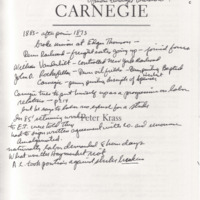-
Title
-
Carnegie
-
Description
-
Explores the life and career of the industrialist who made his fortune in the steel industry, and who was also one of the nation's greatest philanthropists.
-
Identifier
-
1053746
-
471386308
-
Creator
-
Krass, Peter
-
Source
-
Brian Lamb Booknotes Collection
-
Gift of Brian Lamb, 2011.
-
Catalog record
-
Language
-
eng
-
Date
-
2002
-
Program air date: November 24, 2002
-
Publisher
-
John Wiley & Sons
-
George Mason University. Libraries. Special Collections & Archives
-
Text
-
Transcription of Annotations
Front and back endpapers contain extensive notes regarding biographical information on Andrew Carnegie, his relationship with his mother who is characterized as overbearing, his love for reading which prompted his lifelong efforts to support libraries, his involvement with the Pennsylvania Railroad, his lengthy courtship with Louise Whitfield, who he married at age 52 after his mother's death. Other notes record his trip around the world in 1878 and his almost yearly trips to England and Scotland. Carnegie invested in the Pennsylvania Railroad, the Edgar Thomson Steel Company, oil, newspapers in Britain, and became incredibly rich: at the end of his life he had given away $350 million and had built over 2800 libraries in countries around the world. Notes state that Carnegie embraced the philosophy of Herbert Spencer, characterize him as a religious agnostic, who donated $3.6 million for church organs and was also interested in Darwinism. Also included are notes on Carnegie's relationship with labor: on the one hand he tried to put himself up as a progressive on labor, on the other he told labor that there is no excuse for a strike; he broke the union at Edgar Thomson. Carnegie is said to be extremely reactionary in all matters with an oppressive management style. Notes referring to his relationships with Benjamin Harrison, Grover Cleveland, William McKinley, Theodore Roosevelt, William Howard Taft, Woodrow Wilson and Mark Twain are also included. Carnegie had little use for politicians who couldn't be bought and used his money to buy influence: he contributed $25,000 to Republicans; in 1910, after meeting with Taft at the White House, Carnegie announced the creation of the Carnegie Endowment for International Peace and financed it by donating $10 million. Detailed notes refer to the Homestead Tragedy in 1892, an incident that occurred during a strike at the Homestead Steelworks in Pittsburgh, when during a battle between strikers and guards 13 were killed and 100 wounded. -- Annotations by Brian Lamb in the margins and underlining of pertinent phrases throughout the book.
-
Subject
-
"Carnegie, Andrew, 1835-1919."
-
"Industrialists--United States--Biography."
-
"Philanthropists--United States--Biography."
-
"Steel industry and trade--United States--History."
-
Relation
-
Original Booknotes interview
-
Rights
-
This work may be protected by copyright laws and is provided for educational and research purposes only. Any infringing use may be subject to disciplinary action and/or civil or criminal liability as provided by law. If you believe that you are the rights-holder and object to Mason’s use of this image, please contact speccoll@gmu.edu.
 1053746.pdf
1053746.pdf